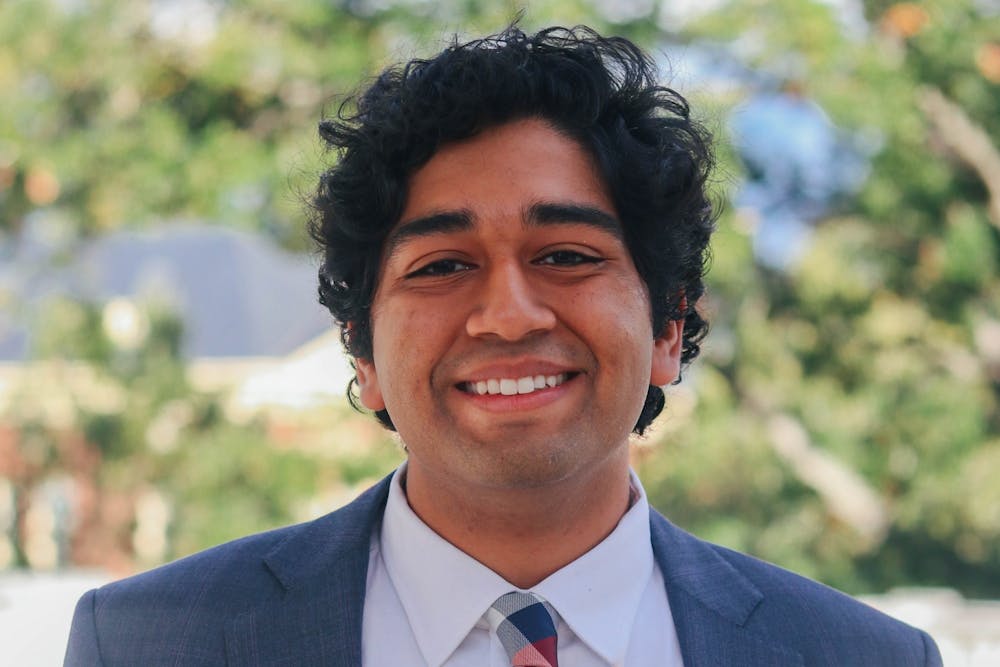After spending his entire college career working with the University Judiciary Committee — most recently, as Chair of the organization — fourth-year College student Nabeel Raza says goodbye to the Committee. Raza spoke highly of the group’s progress towards increased diversity and restorative sanctions.
Raza said that the theme he would associate with his term as UJC chair would be “change and flexibility.” As a four-time member of the Executive Committee, Raza mentioned how incredible it was to see UJC acclimate to the higher volume of cases from COVID-19 violations — with a record number of 53 cases spring 2021 due to COVID-19 violations. Last spring semester, the Committee adjudicated 12 cases — five of which were COVID-19 related.
“The only constant is change,” Raza said. “I think the difference is [everything] has been changed at a global level that very few generations get to say they've lived through, and it's been incredible seeing UJC sort of adapt and live alongside that.”
Some of Raza’s goals as chair of UJC included increasing diversity within the committee itself.
Per the UJC’s 2022-2023 demographics report, the organization’s members are 62 percent white, an increase from the 52 percent overall in the University’s undergraduate population. 16 percent of members identify as Asian compared to 15 percent of the University, and eight percent as Black compared to seven percent of the University and one percent as Hispanic compared to seven percent of the University.
Raza attributes this lack of diversity to the lack of trust between the Committee and the University community. To rectify this lack of trust, Raza aimed to increase the Committee’s transparency by improving student understanding of how UJC operates. Raza also worked to build relationships with other student leaders to strengthen the relationship between the UJC and the student body as a whole.
Raza also served on the Diversity and Inclusion subcommittee, committed to creating a more diverse Committee that represented the entire student body.
“We need to work hard to make sure our culture and our system is one in which BIPOC students and [first generation and low income] students can be supported,” Raza said.
Raza said he was proud to have made UJC a less punitive system, instead focusing on providing growth and restorative sanctions for individuals and organizations — particularly while serving as Vice Chair of Sanctions. He believes that because the students involved in UJC understand the student experience at the University, they are able to be empathetic when looking at cases.
“I'm pretty proud to say that we are fully committed to a restorative justice model,” Raza said. “And I can proudly say that throughout every case that I've seen this semester, that's the model we've employed and I think it's a model that's going to stick around.”
Progress towards restorative sanctions, Raza said, is evident in that nobody appealed any verdicts or sanctions from the past term. A student can appeal a decision made by the UJC within two weeks after the decision if they feel that there was a procedural or prejudicial error occurred or if the student was not afforded basic procedural protections. Though appeals are seen as “healthy” in UJC by providing a check on the judicial system, Raza still saw it a major accomplishment to be celebrated by the whole Committee as it suggests that sanctions are fair.
In addition to efforts towards a restorative system, Raza also said he remains honored to have been selected as UJC chair in the first place, saying that the job was not always easy but incredibly rewarding. He looks forward to the group’s work in years to come — encouraging his successor, second-year College student Lisa Kopelnik, to continue the progress.
“Trust yourself, [Lisa], I think you're making big decisions that no one has ever prepared you for,” Raza said. “I think you have to trust yourself to make these decisions because if you don’t, you're just not going to be able to act in the way that you need to.”
Raza said that weathering the challenges of change was made easier by the community and camaraderie found in UJC. He also mentioned the incredible opportunity that UJC provided to advocate for fellow students.
“The amazing part of this role is that you are every day affecting student life at a very high level in a way that students at other universities throughout the country and maybe the world cannot do,” Raza said.
Raza’s last day as UJC chair was April 1 and he passed his role over to Kopelnik in his final meeting April 2.







